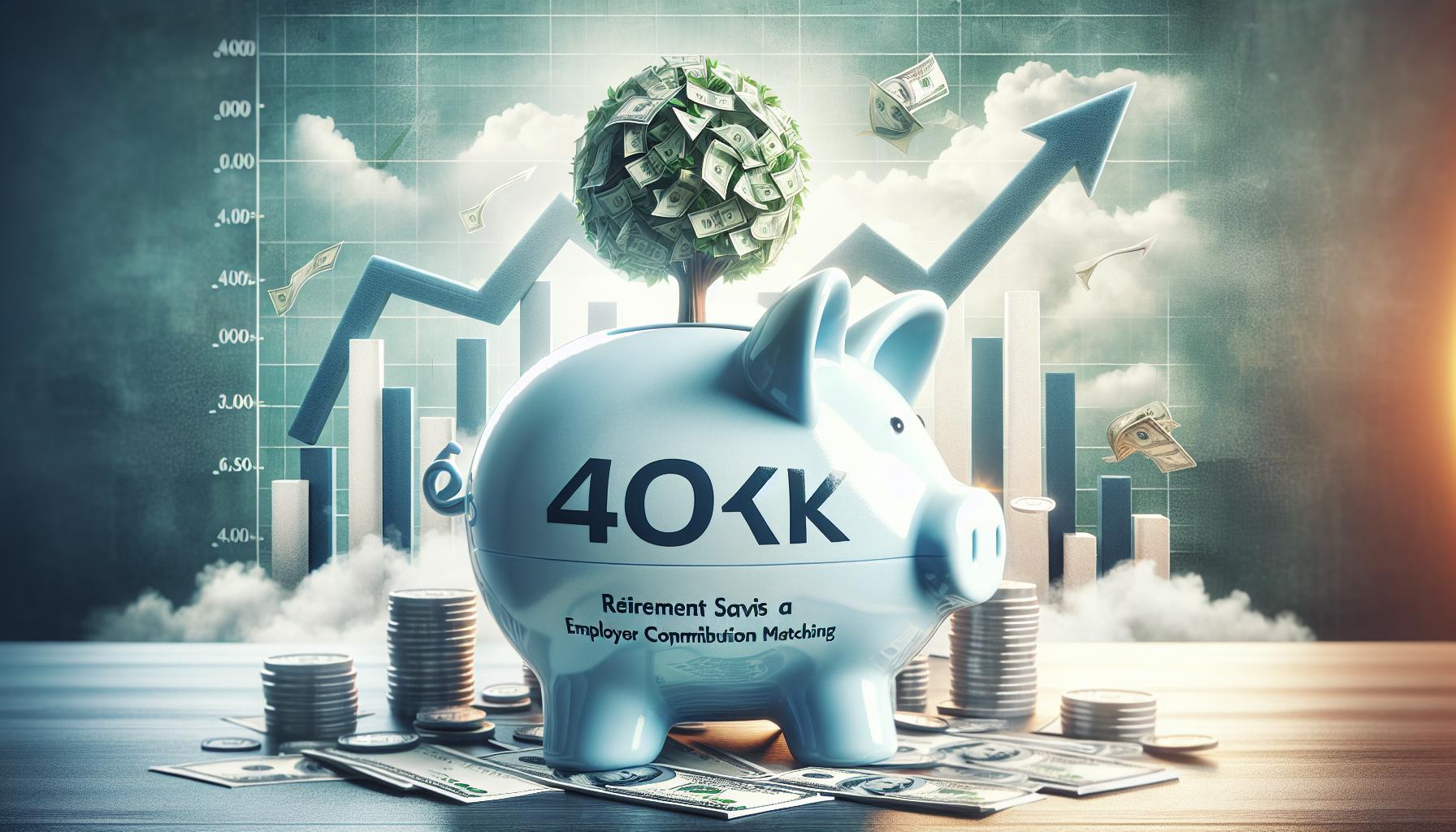Debunking Myths: Can the Government Legally Seize Your 401k?
You’ve worked hard, stashed away savings, and now you’re looking forward to retirement. But there’s a nagging question in the back of your mind: “Can the government take my 401k?” It’s a valid concern, and one I’ll address in this article.
The idea of a secure retirement is a cornerstone of the American dream. We all want to believe that the money we’ve painstakingly saved in our 401k plans is safe and untouchable. But is it really? Let’s delve into the facts and dispel some common myths.
Understanding the potential risks to your retirement savings is crucial. With the right information, you can make informed decisions and protect your hard-earned nest egg. So, let’s get started, and explore whether the government can really lay claim to your 401k.
The Importance of Retirement Savings
Many folks might easily shrug off the importance of retirement savings. They’ll say, “I’m young. I’ve got plenty of time to save.” But procrastination can be a dangerous adversary. The longer you wait, the less time those savings will have to grow.
The power of compounding is a basic principle that plays a vital role in growing your retirement savings over time. It’s nothing more than your investments earning interest, then that interest earning interest on itself. It’s almost like a snowball rolling down a hill, growing bigger and bigger as it goes. The earlier you start, the larger your snowball gets – in essence, the more money you’ll have for your golden years.
Consider this comparison. If you start saving $100 a month at age 25, with an average annual return of 7%, you’d retire at age 65 with approximately $264,000. Wait until you’re 40 to start saving that $100 a month, and you’d only have about $101,000 come retirement. Big difference, huh?
| Age | Investment | Retirement Savings |
|---|---|---|
| 25 | $100/month | $264,000 |
| 40 | $100/month | $101,000 |
It’s not just about saving money, retirement savings are also about securing a good quality of life. Once you retire, your income may decrease, but your expenses likely won’t, and they might even increase due to health care costs. Having a substantial nest egg ensures that you’re not reliant on just your Social Security benefits for all your post-retirement expenses.
Lastly, by saving for retirement you’re not just preparing for the future – you’re also giving yourself peace of mind in the present. There’s comfort in knowing that you’re on track for a financially secure retirement, and less stress today can contribute to better health and happiness overall.
What is a 401k?

The term “401k” might sound like a far-flung planet from a sci-fi movie, but it’s actually a very earth-bound and essential part of financial planning. In simple terms, it’s a type of retirement savings account that’s offered by many employers in the United States.
Picture the 401k as a special piggy bank. But unlike your childhood version, this one comes with some exciting perks. For starters, the money you put in isn’t taxed right away—that only happens when you take it out, someday far in the future, to use during your retirement years.
The 401k Perks
Employer Match: The truly amazing part about a 401k is the employer match. Think of it like a bonus, where your employer also contributes to your 401k. They might match exactly what you’re putting in, or a part of it, depending on their policy. So if I chip in $100 and my employer offers a 50% match, I’ll see $150 in my 401k. That’s immediate return on my investment!
The Power of Compounding: One of the remarkable benefits of a 401k is the magical power of compounding. It’s like having a money garden: the small savings seeds you plant early in life can grow into a mighty money tree over time.
The table below breaks down the basics of a 401k for easy reference:
| Aspect | Description |
|---|---|
| What is 401k? | A retirement savings plan offered by employers. |
| Taxation | Money is taxed when withdrawn, not when deposited. |
| Employer Match | Many employers match a percentage of your contribution. |
| Compounding | Allows for growth over time, potentially resulting in a larger retirement fund. |
So, to answer, “What is a 401k?”, it’s a phenomenal tool for ensuring you can continue to live comfortably long after you’ve left the workforce.
Myths and Concerns
The puzzle of securing financial stability in retirement isn’t simply about how to save. It’s equally essential to protect what you’ve saved, especially against misconceptions and fears that can lead to poor decisions. Let’s dispel some common myths and concerns that might make you think, “Can the government take my 401k?”
Myth 1: The Government Can Seize Your 401k
Contrary to popular belief, the government generally can’t confiscate your 401k, even in dire economic situations or fiscal crises. Established Federal law designates these funds as untouchable, giving peace of mind to millions of hardworking Americans.
Still, there are scenarios where the government’s prying hands might claw into your 401k:
- Unpaid federal taxes: If you have outstanding debt with Uncle Sam, the IRS can tap into your 401k. Keep square with your tax obligations.
- Legal judgements: If you’re subject to a civil or criminal legal ruling, depending on state laws, your 401k could be vulnerable.
Myth 2: Early Withdrawals are Always Taxed and Penalized
Generally, withdrawing from your 401k before age 59.5 incurs both taxes and a 10% penalty. However, exceptions exist. For instance, if you are disabled, certain medical expenses, or if you set up equal periodic payments under IRS rule 72(t), these penalties can be side-stepped.
Finally, many people worry about the effects of future legislative changes on their 401k. Yes, the government can change laws concerning 401ks. However, wholesale confiscation has never been seriously considered.
Armed with these facts, it rings clear why my mantra remains ‘knowledge is indeed power.’ Keeping apprised of retirement-savings-related myths and concerns, and how to navigate them, is a surefire technique to maximize your financial safety net.
Government Regulations and Protections
Diving deeper into the question, “Can the government take your 401k?” it’s essential to have a clear understanding of the laws and protections in place. After all, knowledge is power when it comes to securing your hard-earned money.
Firstly, let’s tackle the heart of the matter. By law, the government cannot take your 401k, even in cases of civil or criminal issues. The Employee Retirement Income Security Act (ERISA) safeguards traditional 401k plans, protecting them from seizure or garnishment. So you can rest assured, your 401k is in safe hands.
That’s not to say that 401ks are completely untouchable. There are a few exceptions. In the case of federally guaranteed student loans or overdue taxes, the Internal Revenue Service (IRS) could potentially get access to these funds. However, this is generally a last resort, and the IRS will try to find other solutions before dipping into your retirement savings.
You might also be wondering about potential changes in the future. Could new laws put your 401k at risk? While it’s impossible for me to predict future legislation, historical trends suggest that the government is more likely to offer additional protections rather than take benefits away.
One such example is the Secure Act passed in 2019. It made significant improvements to 401ks, including a push for more small businesses to offer these plans, allowing long-term, part-time workers to participate, and increasing the age for mandatory withdrawals.
Lastly, it’s always smart to stay informed and proactive. Keep an eye on new laws or regulations that may affect your 401k. Speak with a financial advisor if you have any doubts. Yes, saving for retirement might seem complex, but with the right information, you can navigate it confidently.
Potential Risks to Your 401k

While it’s uncommon for the government to directly interfere with your 401k, other possible risks could impact your retirement savings if you’re not careful. Let’s consider some of the key factors that could potentially pose a risk to your 401k savings.
Market Risk
First and foremost, market risk is a major concern for all investors. The value of your 401k can fluctuate with the ups and downs of the market. It’s a natural part of investing, but during significant downturns, it can dramatically reduce your savings.
I always tell my readers, when investing in a 401k, it’s crucial to understand how market risk works. A well-diversified portfolio usually helps mitigate such risks. But, keep in mind, the market doesn’t always behave how we’d like, and the risk of loss is always a possibility.
Early Withdrawal Penalties
Watch out for early withdrawal penalties! When you contribute to a 401k, that money isn’t meant to be touched until you’re 59 1/2. Take it out early, and you’ll likely pay a penalty. Additionally, you’ll also owe income tax on the amount withdrawn. This can lead to a substantial reduction in your overall savings for retirement, directly impacting your future financial stability.
| Traditional 401k | Early withdrawal penalty | Income tax |
|---|---|---|
| Yes | 10% | Applicable |
Personal Debt and Bankruptcy
Can creditors come after your 401k? Yes, personal debt and bankruptcy can pose a risk. If you declare bankruptcy, a judge may allow creditors to access your 401k savings to pay off your debts. However, it’s a measure of last resort, as the law generally tries to protect these funds.
It’s important to consider potential risks to your 401k and how to manage them effectively. Always remember, staying informed and making prudent decisions is the key to safeguarding your retirement nest egg. The more you know, the better equipped you’ll be to build and protect your 401k savings.
Conclusion
Let’s put your worries to rest. The government can’t just snatch your 401k. The ERISA law has your back, shielding your retirement savings. Yes, there are exceptions like overdue taxes or student loans, but these are last-resort measures. Historical trends are your friend here, showing government’s tendency to beef up 401k protections, not strip them away.
However, don’t let your guard down. Other threats loom, such as market risks, early withdrawal penalties, and creditors in cases of debt or bankruptcy. It’s crucial to stay informed, keep an eye on new laws or regulations, and make smart decisions. Doubts or concerns? Reach out to a financial advisor. Your 401k is your future security. Protect it wisely.
Can the government seize my 401k?
By law, the government cannot take your 401k due to the protections provided by the Employee Retirement Income Security Act (ERISA). Exceptions exist for cases involving federally guaranteed student loans or overdue taxes.
Is there a possibility of my 401k benefits being taken away?
Historical trends suggest that the government is more likely to provide additional protections to your 401k rather than take away benefits. Always stay informed about new laws or regulations.
What are the other risks to my 401k savings?
Your 401k savings can be affected by market risk, early withdrawal penalties, or creditors in case of personal debt or bankruptcy. It’s vital to make informed and prudent decisions to protect these savings.
Who should I consult about my 401k?
If you have doubts or questions about your 401k, it’s advisable you consult with a financial advisor. They can provide tailored advice and guidance based on your personal financial situation.







